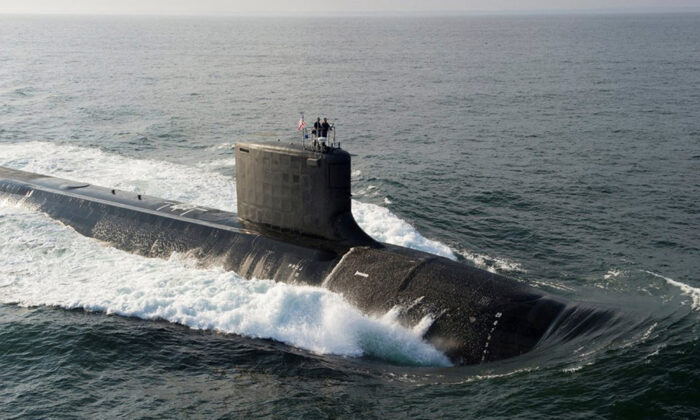Ex-Australian Prime Minister Recommends New Zealand Reconsider Its Nuclear Free Policy
New Zealand is currently exploring its options regarding AUKUS membership.
Former Australian Prime Minister Scott Morrison has recommended that the New Zealand government reconsider its decades-old policy prohibiting nuclear-powered naval vessels from entering its ports if it wishes to join the AUKUS pact.
“I understand that this is a highly sensitive issue in New Zealand with a significant history,” Mr. Morrison stated during an interview with Stuff’s Tova podcast when discussing the potential implications of overturning the ban.
New Zealand is contemplating joining pillar two of the AUKUS agreement, which involves Australia, the United States, and Britain. However, since Australia is set to receive three Virginia-Class nuclear submarines from the U.S. by the early 2030s, maintaining an anti-nuclear stance would prevent these vessels from entering New Zealand’s waters, jeopardizing the foundation of the defense agreement.
New Zealand’s anti-nuclear position has played a vital role in shaping its foreign policy identity since the 1980s, positioning itself as a strong advocate for peace, environmental protection, and sovereignty. This stance originated in the 1950s due to concerns about nuclear weapons testing in the Pacific and was further solidified by the 1985 bombing of the Greenpeace vessel, the Rainbow Warrior, in Auckland by two undercover French intelligence agents.
In response to these events, the New Zealand Nuclear Free Zone, Disarmament, and Arms Control Act was enacted in 1987, prohibiting the entry of nuclear-powered or nuclear-armed ships into New Zealand waters and outlawing the manufacture, possession, or use of nuclear weapons within the country.
This stance has been met with controversy, particularly in its relationship with the U.S. Following the policy implementation, the U.S. suspended its ANZUS (Australia, New Zealand, United States Security Treaty) commitments to New Zealand in 1986.
This week, Japan’s Prime Minister held discussions with U.S. President Joe Biden regarding the possibility of joining pillar two of AUKUS to contribute to artificial intelligence and develop quantum technologies for military purposes.
New Zealand is also rumored to be evaluating its membership options, with Foreign Minister Winston Peters meeting with U.S. Secretary of State Anthony Blinken this week and asserting that there were compelling reasons for New Zealand and AUKUS to collaborate pragmatically.
Nuclear Benefits vs. Defence Cooperation
The main concern with nuclear-powered submarines is the risk of radiation leaks. These submarines contain radioactive materials, and any malfunction could result in the release of harmful radiation, posing a threat to the crew, the marine environment, and nearby populations.
Several countries, including the U.S., Russia, China, the UK, France, and India, operate nuclear submarines with stringent safety measures in place to mitigate risks.
Mr. Morrison believes it is time for New Zealand to reassess its nuclear policy. However, in December 2023, Prime Minister Chris Luxon reaffirmed New Zealand’s nuclear-free status quo, stating that it was non-negotiable despite acknowledging the benefits of sharing AUKUS military technology in a more challenging world.
Mr. Luxon emphasized that New Zealand views Australia as its primary defense ally, committed to working closely together as core partners in the region alongside Pacific Island nations.
Australian Senate Refers Nuclear Prohibitions Bill for Inquiry
In October 2022, the Australian Senate referred the Environment and Other Legislation Amendment (Removing Nuclear Energy Prohibitions) Bill 2022 for inquiry to evaluate the possibility of lifting legislative prohibitions on nuclear energy for civilian use. The inquiry determined that there was no justification for lifting these prohibitions based on factors such as feasibility, cost, and unproven technology.
Despite this, Mr. Morrison highlighted discussions within the Liberal Party about establishing a civil nuclear industry in Australia and suggested that New Zealand should consider a similar approach.
He stated, “These matters are always worth exploring in a mature and sensitive manner,” emphasizing the potential for New Zealand businesses to engage in AUKUS-related projects and collaborate with partners from Australia, the UK, and the US in various areas.
A joint statement issued by the US and New Zealand on April 9 indicated a growing collaboration between the two nations:
“Our countries are closely aligned in our fundamental values and interests. Having strong partners like New Zealand is crucial for the United States in navigating a challenging world,” noted Mr. Blinken.
“The strategic landscape faced by New Zealand and the United States is more demanding than ever, necessitating urgent and concerted cooperation,” Mr. Peters added.



